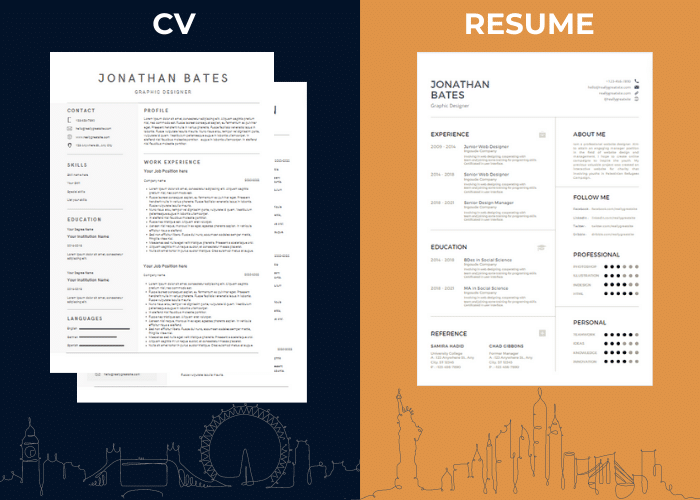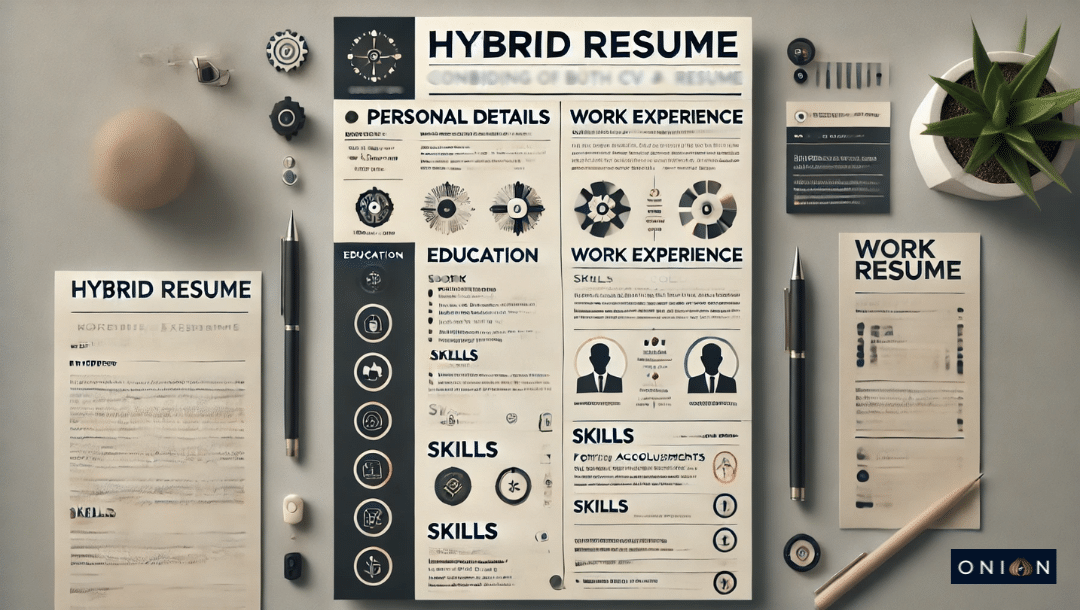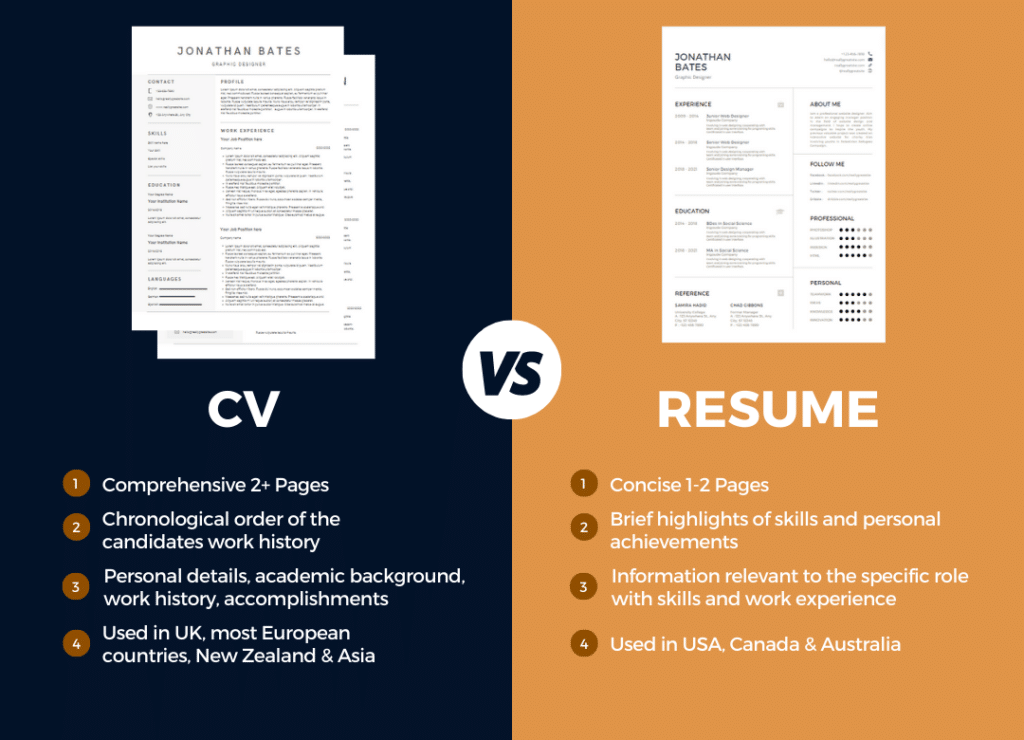So, what is the difference between CV and Resume? Are they not the same thing? Do they not serve the same purpose?
Table Of Contents
What is the difference between CV and Resume?
When it comes to job applications, two terms often come up: CV and resume. Many people use these two terms interchangeably, but they do actually refer to two distinct types of documents. Understanding the difference between a CV (Curriculum Vitae) and a resume is essential for crafting an effective application. In this article, we will explore the characteristics, purposes and appropriate usage of CV and resume, helping you to navigate the intricate world of job applications with confidence.

What is a CV?
A Curriculum Vitae, commonly known as a CV across most European countries, is an exhaustive and comprehensive document that follows a chronological structure, providing an in-depth overview of an individual’s academic and professional achievements, experiences and qualifications. It is typically used in academic, research, or scientific fields, as well as when applying for positions internationally. A CV tends to be much more detailed and lengthy than a resume, often spanning multiple pages; though this is another topic for debate.
Key Features of a CV
- Academic and professional background: A CV usually includes detailed information about education, research, publications, presentations, conferences attended and any relevant certifications or licenses in relation to your profession.
- Comprehensive work history: A CV highlights an individual’s entire work history, including positions held, responsibilities, achievements and projects completed.
- Lengthy and detailed: A CV allows ample space to elaborate on various aspects of your professional life, encompassing a comprehensive overview.
When to use a CV
A CV is typically used in the following scenarios:
- Academic and research positions: When applying for faculty positions, research fellowships, or graduate programs, a CV is the preferred document of choice.
- International job applications: In some countries, such as the United Kingdom, Ireland, or New Zealand, a CV is the standard document for job applications, regardless of the industry or career level.
- Highly specialised or senior roles: If you’re applying for a position that requires extensive experience or specialised knowledge, a CV may be more appropriate to demonstrate your expertise thoroughly.
What is a Resume?
In contrast to a CV, a resume is a concise and targeted document that provides a snapshot of an individual’s relevant skills, work experience and accomplishments. Resumes are widely used in the corporate world and are tailored to specific job applications. They are typically one to two pages in length and are designed to grab the attention of potential employers quickly.
Key Features of a Resume
- Summary of qualifications: A resume often includes a summary or objective statement that highlights your key skills, experience and career goals.
- Tailored for specific positions: Resumes are customised to align with the requirements and qualifications sought by the employer.
- Concise and focused: Unlike a CV, a resume focuses on presenting the most relevant information concisely, emphasising achievements and skills that directly relate to the desired role.
When to use a Resume
A resume is suitable for various job applications, including:
- Corporate positions: In the business world, a resume is the standard document for job applications, whether you’re applying for entry-level or executive roles.
- Industry-specific roles: Resumes are commonly used when applying for positions in fields such as marketing, sales, finance, IT, customer service and many others.
- Job fairs and online applications: Resumes are ideal for quick and easy distribution during job fairs or when applying online through company websites or job portals.
The Introduction of the Hybrid Resume
It has become increasingly common to see a combination of CV and resume formats, particularly for experienced professionals who have a strong track record of accomplishments. This type of resume, known as a hybrid resume is designed to showcase both your skills and experience in a way that is tailored to the specific job requirements.

A hybrid resume typically follows the chronological structure like the CV with your work experience listed in reverse-chronological order. However, it also includes a section that emphasises your skills and accomplishments, similar to a functional resume.
There are several benefits of using a hybrid resume:
- Showcasing your skills: The skills section of a hybrid resume at the beginning allows you to highlight key competencies relevant to the job, making it easy for employers to quickly identify your strengths.
- Addressing Employment Gaps: If you have gaps in your employment history, the hybrid resume format enables you to focus on skills first, helping to downplay any chronological gaps and draw attention to your abilities.
- Career Changes: If you’re transitioning to a new field or industry, the hybrid resume allows you to emphasise your transferable skills upfront, making it easier for employers to see your suitability for the role.
- Emphasising Achievements: By leading with a section that highlights accomplishments on your hybrid resume, you can immediately capture the reader’s attention and demonstrate the impact you’ve had in previous roles.
- Tailoring to the Job: The hybrid resume format is adaptable, allowing you to tailor the skills and work experience sections to match the specific requirements of the job you’re applying for.
By understanding the key features and appropriate usage of a CV, resume or hybrid resume, you can effectively showcase your qualifications and experience. When creating your application, consider the following tips:
- Research the expectations: Understand the requirements and expectations of the industry and country you are applying to. Some regions may favour CVs, while others may lean towards the resume.
- Customise your application for each role: Tailor your CV or resume to align with the specific job requirements. Highlight skills, experiences and accomplishments that directly relate to the desired position.
- Keep it concise: While a CV can be detailed, avoid unnecessary information overload. Focus on relevance and keep your document organised and easy to read.
- Use proper formatting: Pay extra attention to the layout, font and structure of your document. Use the white space effectively; insert headings and utilise bullet points instead of lengthy paragraphs to enhance readability.
- Highlight achievements and accomplishments: Whether you use a CV or a resume, emphasise your accomplishments to demonstrate your value and capabilities to potential employers.
- Proofread and edit, once, twice, thrice: Avoid errors and inconsistencies by thoroughly proofreading your document. Don’t just glance over it. Take the time to review every aspect of it. Consider seeking feedback from trusted peers or professionals to ensure your application is polished.

Remember, the choice between a CV and a resume depends on the specific context and requirements of the job application. Whether you chose a CV, resume or a hybrid resume understand their differences and utilise the appropriate document that effectively presents your skills, experiences and qualifications to capture the attention of potential employers.
However, one thing they all share is effective communication. According to HR executive Kathy Short, Yorktown Systems Group, candidates with a well-written resume highlighting strengths, background and skills and industries they have worked in are going to be noticed. Otherwise, they most likely won’t move forward.
Don’t let the challenges of crafting a compelling CV or resume hold you back in your job search. Instead, partner with our dedicated team of professionals. Our CV writing services are designed to cater to your unique needs, ensuring that you receive a personalised document that sets you apart from the competition.
Further information on CV and Resumes:
The Open University has a vast range of CV writing and interview preparation here
Visit Monster.co.uk to download an ebook entitled How to create the perfect CV
What skills do recruiters look for in resumes

